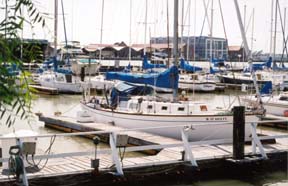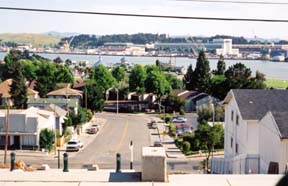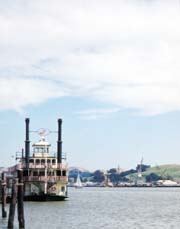In
the food department, Harold tells me the three Vallejo favorite
institutions where everyone goes to eat are the House of Soul, run
by McCarver family for over 20 years; Banana Q on Georgia Street, a
Filipino restaurant and cultural center of sorts, with kareoke, ball
room dancing, and weddings; and the taco truck, Tacoís Jalisco.
For a while the taco truck was set up in different parking lot
locations, but they got tired of moving around and bought their own
parking lot at Broadway and Texas. Make no mistake-there are a lot
of wanna-be taco trucks-be sure itís Tacoís Jalisco.
 |
| Vallejoís
Waterfront |
On the waterfront, ice
cream is available at the California Wine Ship office near the ferry
terminal. The California Wine Ship also acts as the Riverboat
Steakhouse when not on a cruise. If you brought a bike, you could
venture from downtown for goodies like those at Liledís Ice Cream
and Candy Kitchen at 1318 Tennessee Street, where chocolate and ice
cream are made on the premises, or Georginaís Coffee House at 1505
Tennessee Street, with house baked pastries and gourmet sandwiches.
Heading northwest from the ferry terminal, thereís lots of room to
bike along Vallejo Waterfront Park. En route you pass the Vallejo
Yacht Club, with waterfront views to Mare Island and the Strait. The
Sardine Can at the municipal harbor offers casual waterfront dining.
Further on, the Waterbarge Tavern is more elegant. Next, you pass
under the Mare Island causeway to your destination-River Park. A
paved trail passes along the Strait here, and there is a nice marsh.
When the route ends, you can simply return the way you came.
 |
| Mare
Island from Vallejo |
2. With advance reservations
on one of Mare Island Historic Park Foundationís tours, you can
visit Mare Island. (For now, you cannot visit the island without a
guide. Tour guides will pick you up at and return you to the ferry
terminal.) The 3-mile long island is a National and State Historic
Landmark. You can view St. Peterís Chapel, the oldest Naval Chapel
in the Pacific, with 29 beautiful stained glass windows designed at
Tiffany Studios, 16 of which were produced and signed by the
studio-a priceless collection of stained glass is one of the finest
anywhere. The officerís row mansions with their beautiful gardens,
are a feast for the eyes, and you can tour the interior of the
Admiralís Mansion with special arrangements. Mare Island Historic
Park Foundation tours also visit the cemetery and Alden Park, with
its Polaris missile and a German W.W.I suicide submarine, and trees
from around the globe. Especially impressive is the shipyard, where
513 ships were built over the Islandís years of service, and Dry
Dock #1, built over a period of 17 years with stones hand cut and
brought from the Sierras.
There are many versions of
the story of how Mare Island got its name. Ken Zadwick, founder of
the Mare Island Historic Park Foundation, and tour guide, tells the
same version that General Vallejoís son Platon Vallejo relays in
"Memoirs of the Vallejos". In the old days, they used
to swim the horses across river. One late afternoon while they were
doing so, treacherous currents took the horses out into bay. It got
dark, and there wasnít time to go after the horses. They were
presumed lost, but 3 days later, General Vallejo saw his old mare
running around on the island. When he went to Monterey to report to
the commanding officer, he told him this story. The commanding
officer, who was responsible for naming all of the areas described
in the mapping expedition of General Vallejo, determined that the
island would be called "Isla de la Yegua," or Mare Island.
Mare Island Naval Shipyard
took shape under Commander David Glasgow Farragut, who later became
the nationís first Admiral for his victories in capturing New
Orleans, Vicksburg, and Mobile Bay during the Civil War. During
World War II, the island employed over 46,000 people, and was one of
the most important ship repair facilities for the Pacific Fleet.
World War II and Mare Island dramatically changed Vallejo, almost
quadrupling its population and employing most of it. Mare Island
Naval Shipyard built the first nuclear submarine on the west coast
in 1954. Many more were built here, ending with the USS Drum in
1970. Repair of nuclear submarines continued into the 1990s. The
Mare Island Historic Park Foundation will open the USS Drum for
public tours in Dry Dock #1 as soon as it is retrofitted for public
use. The most recent project of the foundation is the reprint of
Lieutenant Commander Lottís "A Long Line of Ships,"
describing the first 100 years of Mare Island history. Out of print
for 25 years, the historic book was written in 1954 as part of the
100 year anniversary celebration.
Change will be coming soon
to Mare Island. The Navy left Mare Island in 1996, and contractors
are doing the required environmental clean up. When that is
complete, Mare Island will be turned over to the City, and open the
public. There are currently 65 civilian tenants here, including XKT
Corporation, who utilizes the machinery left over from the submarine
manufacture process to make towers for San Francisco International
Airport and sections for the new bridges in Bay Area. In addition to
the industrial, educational, recreational, residential, and
historical areas planned for Mare Island, the foundation will open a
50,000 square-foot Mare Island Historic Park Foundation Museum in
2002, housed in the blacksmith shop behind Dry Dock 1,
appropriately, the oldest building on the island.
 |
| The
California Wine Ship |
3. Back near the ferry
terminal, the California Wine Ship provides your ride to Napa. The
outfit offers brunch with wine country tours and tastings every
Sunday. You begin with a 2-hour cruise and buffet of champagne and
Belgian waffles while the boat cruises the waters of the Napa
Wildlife Refuge. Afterwards, you board a bus and head to Napa to
tour the wineries: Viansa; RMS Distillery (who makes a California
alambic brandy that, because of the high alcohol content is
prohibited from tastings, but you are encouraged, even instructed in
how to sniff); and Domaine Carneros, who produces sparkling wines in
a chateau-like setting. If you are part of one of the Wine Shipís
smaller parties, you get to vote on where to go after that-perhaps
to the Sonoma Cheese Factory. The California Wine Ship was built
from scratch in Fort Bragg in 1992 by Bill Barker. Formerly the
Petaluma Queen, she ran as a restaurant on the Petaluma River for
seven years before coming to Vallejo. The Barker family still runs
the outfit. Bill is the owner and captain and his daughter Sharana,
will be your head waitress.
CONTINUE